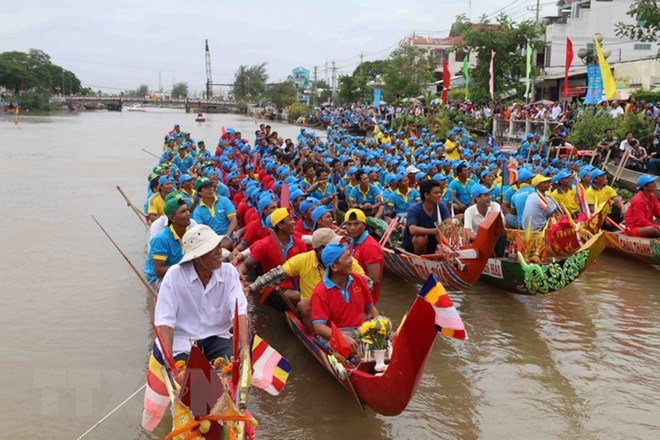
Ooc Om Bok Festival, also called the Festival of Worshiping the Moon, will take place in the Mekong Delta province of Soc Trang from November 16-22, with various activities to celebrate the traditional Khmer festival.
"Ngo" boat race at last year's Ooc Om Bok festival
(Photo: VNA)
A moon-offering ritual, lantern-release ceremony, photo exhibition, Khmer
traditional dance festival and trade and cuisine fair will be held during the
event.
Notably, a "Ngo” boat race - the highlight of the festival - is scheduled for
November 21-22, bringing together 48 teams from Soc Trang, Bac Lieu, Ca Mau,
Hau Giang and Vinh Long provinces.
In addition, there will be a workshop on enhancing local small- and
medium-sized enterprises’ capacity to approach the Fourth Industrial Revolution
(Industry 4.0).
According to Danh Phuong, deputy head of the board for ethnic minority affairs
of Soc Trang province, the event aims to preserve and promote traditional
values of Khmer people while popularising local strengths in economy, culture
and tourism.
Ooc Om Bok is three main festivals, along with Sene Dolta and Chol Chnam Thmay,
that Khmer people celebrate every year. It begins around 7-8 pm on the evening
of 14th of the 10th lunar month when the moon’s position is high in the sky.
Khmer people celebrate at home outdoors or at Khmer pagodas, praying for good
luck, happiness, good weather and bumper crops.
Source: VNA
Phong Phu commune, Tan Lac district of Hoa Binh province, is widely regarded as the cultural heartland of the Muong ethnic group. Among its many traditional communities, Luy Ai hamlet (formerly Ai hamlet) stands out as a rare location where the customs and way of life of the Muong Bi people remain largely intact.
The Truong Kha temple festival, a distinctive cultural event held every three years in Vu Ban township, Lac Son district, returned recently with vibrant rituals and folk traditions of the Muong people. Located next to the Buoi River in the Muong Trao fields, the Truong Kha Temple is dedicated to the three Kun Dol deities, revered for teaching farming techniques, irrigation, weaving, and protecting the harvest.
The demand for spaces serving community activities of residents in various areas across Hoa Binh city has been satisfied as local cultural houses now feature modern, spacious facilities thanks to the effective implementation of Resolution No. 49/NQ-HDND issued on December 28, 2021 by the city People's Council, which approved the plan for reorganising, converting, and allocating land for the construction, repair, and expansion of cultural houses in Hoa Binh’s villages and residential areas until 2025.
At the end of May, the Hoa Binh Provincial Ethnic Arts Troupe organized a series of performances for residents in Region 2 and Region 3 communes across the province. Bringing art to ethnic communities in remote, isolated, and especially disadvantaged areas has become a meaningful activity. These are not merely artistic performances but also journeys to disseminate cultural values, enrich spiritual life, and contribute to preserving the cultural identity of ethnic minorities.



